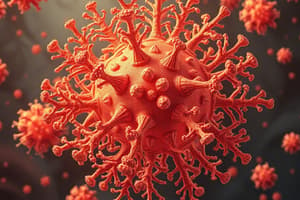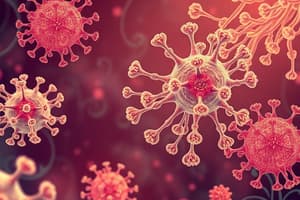Podcast
Questions and Answers
What molecular weight range is generally associated with poor immunogens?
What molecular weight range is generally associated with poor immunogens?
- 70,000 - 90,000 Da
- 30,000 - 50,000 Da
- 5,000 - 10,000 Da (correct)
- 100,000 - 150,000 Da
Which type of immunogen is more immunogenic due to its insolubility?
Which type of immunogen is more immunogenic due to its insolubility?
- Soluble immunogen
- Native immunogen
- Denatured immunogen
- Particulate immunogen (correct)
What type of antigen requires the assistance of T cells for antibody production?
What type of antigen requires the assistance of T cells for antibody production?
- Auto-antigen
- B-cell antigen
- T-independent antigen
- T-dependent antigen (correct)
Which characteristic contributes most to the immunogenicity of a protein?
Which characteristic contributes most to the immunogenicity of a protein?
What defines a hapten in immunology?
What defines a hapten in immunology?
Which type of antigen is characterized by the non-specific activation of T-cells?
Which type of antigen is characterized by the non-specific activation of T-cells?
Which type of antigen is specifically recognized by individuals with autoimmune diseases?
Which type of antigen is specifically recognized by individuals with autoimmune diseases?
What enhances the immunogenicity of an immunogen in terms of its degradation?
What enhances the immunogenicity of an immunogen in terms of its degradation?
Which characteristic is indicative of a good immunogen's stability?
Which characteristic is indicative of a good immunogen's stability?
What type of antigen provokes hypersensitivity reactions in sensitized individuals?
What type of antigen provokes hypersensitivity reactions in sensitized individuals?
Which of the following correctly identifies the main characteristic of T-independent antigens?
Which of the following correctly identifies the main characteristic of T-independent antigens?
What class of antigens is recognized by T cytotoxic cells (CD8+) in normal cell metabolism?
What class of antigens is recognized by T cytotoxic cells (CD8+) in normal cell metabolism?
Which antigens are associated with autoimmune diseases due to a misdirected immune response?
Which antigens are associated with autoimmune diseases due to a misdirected immune response?
Which type of antigen is unique to tumor cells and is the result of tumor-specific mutations?
Which type of antigen is unique to tumor cells and is the result of tumor-specific mutations?
What is the typical immunogenicity of nucleic acids in isolation?
What is the typical immunogenicity of nucleic acids in isolation?
Which type of antigens are primarily presented by Antigen Presenting Cells (APCs) using MHC class II molecules?
Which type of antigens are primarily presented by Antigen Presenting Cells (APCs) using MHC class II molecules?
Which of the following statements accurately describes the immunogenic nature of lipids?
Which of the following statements accurately describes the immunogenic nature of lipids?
What sequence correctly describes the role of MHC class I molecules in antigen presentation?
What sequence correctly describes the role of MHC class I molecules in antigen presentation?
In general, which molecule type is considered the best immunogen?
In general, which molecule type is considered the best immunogen?
What is the primary role of T helper cells in response to exogenous antigens?
What is the primary role of T helper cells in response to exogenous antigens?
What distinguishes an immunogen from an antigen?
What distinguishes an immunogen from an antigen?
Which statement about epitopes is correct?
Which statement about epitopes is correct?
What is the primary factor that influences the degree of immunogenicity?
What is the primary factor that influences the degree of immunogenicity?
Which of the following statements about haptens is true?
Which of the following statements about haptens is true?
What is antigenicity?
What is antigenicity?
Which is a true statement regarding immunogens?
Which is a true statement regarding immunogens?
Which property is NOT relevant to defining an immunogen?
Which property is NOT relevant to defining an immunogen?
Why might a large molecular weight immunogen be more effective?
Why might a large molecular weight immunogen be more effective?
What does not factor into the immunogenicity of an antigen?
What does not factor into the immunogenicity of an antigen?
What type of antigens are expressed at lower levels on healthy cells but are recognizable by cytotoxic T lymphocytes?
What type of antigens are expressed at lower levels on healthy cells but are recognizable by cytotoxic T lymphocytes?
Which of the following best defines an incomplete antigen or hapten?
Which of the following best defines an incomplete antigen or hapten?
What is the primary role of adjuvants in vaccination?
What is the primary role of adjuvants in vaccination?
Aluminum potassium sulfate (alum) acts primarily by:
Aluminum potassium sulfate (alum) acts primarily by:
Freund’s complete adjuvant is characterized by which of the following components?
Freund’s complete adjuvant is characterized by which of the following components?
Which of the following adjuvants is the only one approved for clinical use in the United States?
Which of the following adjuvants is the only one approved for clinical use in the United States?
What is a notable effect of Freund’s adjuvant when injected?
What is a notable effect of Freund’s adjuvant when injected?
The precise mechanism of action of adjuvants is:
The precise mechanism of action of adjuvants is:
In the context of immunology, which process is primarily initiated by complete antigens?
In the context of immunology, which process is primarily initiated by complete antigens?
Why might adjuvants be necessary for certain vaccines?
Why might adjuvants be necessary for certain vaccines?
Flashcards
Antigen
Antigen
A substance that can bind to antibodies or T cell receptors.
Immunogen
Immunogen
A type of antigen that can trigger an immune response.
Epitope
Epitope
The specific part of an antigen that is recognized by antibodies or T cell receptors.
Antigenicity
Antigenicity
Signup and view all the flashcards
Immunogenicity
Immunogenicity
Signup and view all the flashcards
Foreignness
Foreignness
Signup and view all the flashcards
Molecular weight
Molecular weight
Signup and view all the flashcards
Hapten
Hapten
Signup and view all the flashcards
Carrier molecules
Carrier molecules
Signup and view all the flashcards
Good Immunogen
Good Immunogen
Signup and view all the flashcards
Insoluble Immunogen
Insoluble Immunogen
Signup and view all the flashcards
Degradable Immunogen
Degradable Immunogen
Signup and view all the flashcards
Allergen
Allergen
Signup and view all the flashcards
Superantigen
Superantigen
Signup and view all the flashcards
Tolerogen
Tolerogen
Signup and view all the flashcards
T-independent antigen
T-independent antigen
Signup and view all the flashcards
Protein antigens
Protein antigens
Signup and view all the flashcards
Polysaccharide antigens
Polysaccharide antigens
Signup and view all the flashcards
Nucleic Acid antigens
Nucleic Acid antigens
Signup and view all the flashcards
Lipid antigens
Lipid antigens
Signup and view all the flashcards
Exogenous antigens
Exogenous antigens
Signup and view all the flashcards
Endogenous antigens
Endogenous antigens
Signup and view all the flashcards
Autoantigens
Autoantigens
Signup and view all the flashcards
Tumor antigens
Tumor antigens
Signup and view all the flashcards
Tumor-specific antigens (TSAs)
Tumor-specific antigens (TSAs)
Signup and view all the flashcards
Tumor Associated Antigens (TAAs)
Tumor Associated Antigens (TAAs)
Signup and view all the flashcards
Complete Antigen
Complete Antigen
Signup and view all the flashcards
Incomplete Antigen (Hapten)
Incomplete Antigen (Hapten)
Signup and view all the flashcards
Adjuvants
Adjuvants
Signup and view all the flashcards
Aluminum potassium sulfate (alum)
Aluminum potassium sulfate (alum)
Signup and view all the flashcards
Freund's complete adjuvant
Freund's complete adjuvant
Signup and view all the flashcards
Aluminum Salts
Aluminum Salts
Signup and view all the flashcards
Mechanism of Adjuvants
Mechanism of Adjuvants
Signup and view all the flashcards
Cytotoxic T lymphocytes (CTL)
Cytotoxic T lymphocytes (CTL)
Signup and view all the flashcards
Study Notes
Antigens
- Antigens are foreign substances that induce the production of specific antibodies or activate specific immune cells. They specifically interact with immune response products.
- Immunogens are foreign substances inducing a specific immune response (humoral or cell-mediated). All immunogens are antigens, but not all antigens are immunogens.
- Epitopes are the parts of an antigen that are recognized and bound by antibodies (Ab) or T cell receptor/Major Histocompatibility Complex (TCR/MHC) complexes (also called antigenic determinants).
Immunogen Characteristics
- Foreignness: Immunogens must be recognized as non-self by the immune system. A greater phylogenetic distance between species leads to a greater chance of immunogenicity.
- Molecular Weight: There's a strong correlation between molecular weight and immunogenicity. Higher molecular weight generally means greater immunogenicity. Large molecules (100,000 Da) are effective immunogens, while smaller ones (5-10,000 Da) are generally poor immunogens.
- Chemical Nature and Stability: The immunogen's chemical structure must be stable in various conditions (temperature, pH, and biological solutions). Chemical complexity, particularly the makeup of amino acids in a molecule, correlates with increased immunogenicity. More complex structures are better immunogens.
- Physical Form: Insoluble (particulate) immunogens are more immunogenic than soluble ones. Denatured immunogens are more immunogenic than their native forms.
- Degradability: Easily phagocytized immunogens are generally more immunogenic. This is because phagocytosis leads to processing and presentation of the antigen to T helper cells by antigen-presenting cells (APCs).
Other Antigen Types
- Hapten (partial or incomplete antigen): These are low-molecular-weight foreign substances incapable of inducing an immune response on their own. They require combination with a larger molecule (like a protein) to elicit an immune response.
- Allergen: An antigen that provokes a hypersensitivity reaction (allergy) in sensitized individuals.
- Superantigen: An antigen that causes non-specific activation of T cells, leading to polyclonal T cell activation and massive cytokine release.
- Tolerogen: An antigen, usually in a soluble form, that induces immunological tolerance.
- Autoantigen (self-antigen): A normal protein or protein complex (or DNA/RNA) recognized by the immune system of patients with autoimmune diseases. Under normal conditions, these would not be targeted by the immune system.
- Alloantigen (isoantigen): Antigens found in different members of the same species (e.g., blood type antigens like A and B).
- Heterophile antigens: Identical antigens found in cells and tissues of different species (e.g., cross-reacting microbial antigens).
- T-dependent antigen: Antigens needing T cell assistance to induce antibody formation.
- T-independent antigen: (Usually polysaccharides) that directly stimulate B cells.
Antigen Chemical Nature
- Proteins: The majority of immunogens are proteins or protein-molecule conjugates (e.g., glycoproteins, lipoproteins). Generally very good immunogens.
- Polysaccharides: Polysaccharides and lipopolysaccharides are generally good immunogens.
- Nucleic acids: Nucleic acids are usually poor immunogens.
- Lipids: Lipids are typically non-immunogenic and may act as haptens; they only become immunogenic when combined with proteins or polysaccharides.
Antigen Origin
- Exogenous antigens: Antigens that enter the body from the outside (e.g., bacterial structures, toxins, viruses, fungi, parasites).
- Endogenous antigens: Antigens generated within normal cells (e.g., from normal cell metabolism, viral or intracellular bacterial infection).
- Autoantigens (self-antigens): Normal proteins/complexes recognized by the immune system in autoimmune diseases.
- Tumor antigens: Antigens presented by MHC class I or II molecules on tumor cells; those unique to the tumor cells are termed tumour specific antigens (TSAs). Tumor-associated antigens (TAAs) are also present on normal cells though at lower levels.
Antigen Presentation
- Antigens are presented by antigen-presenting cells (APCs), such as macrophages, B cells, and dendritic cells.
- APCs present processed fragments to T helper cells (CD4+) using MHC class II molecules.
- Endogenous antigens are presented by MHC class I molecules to cytotoxic T cells (CD8+).
Adjuvants
- Adjuvants are substances mixed with an antigen to enhance its immunogenicity, often used when the antigen has low immunogenicity or limited amounts are available.
- Adjuvants boost the immune response by stimulating local inflammation, attracting more immune cells to the injection site, and prolonging antigen persistence.
- Examples include aluminum salts (used in many vaccinations, like hepatitis B) or Freund's complete adjuvant (with mineral oil and killed mycobacteria).
Mechanism of Adjuvants
- Precise mechanism remains somewhat unclear.
- It may include increasing the number of cells involved in antibody production, ensuring more efficient antigen processing, prolonging antigen duration in the body, and stimulating antibody synthesis and release.
Studying That Suits You
Use AI to generate personalized quizzes and flashcards to suit your learning preferences.




